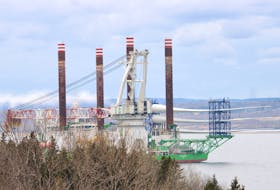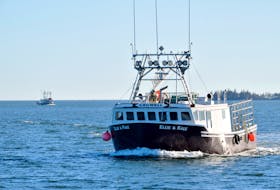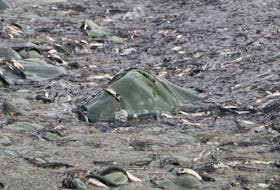Digby Mayor Ben Cleveland says he welcomes a plan by Cooke Aquaculture to build a $60-million, land-based fish hatchery in the county.
Cleveland told SaltWire the hundreds of jobs it will bring during construction will be a boost for the local economy.
“When you spent $60 million in a region of about 10,000 people, that’s a noticeable amount of activity,” he said.
"When you spent $60 million in a region of about 10,000 people, that’s a noticeable amount of activity."
Cooke Aquaculture, parent company of Kelly Cove Salmon, hopes to start construction of the hatchery on private property at Centreville in 2022.
The company operates land-based hatcheries throughout Atlantic Canada.
The other hatcheries are smaller, however, and smolt are typically transferred to seawater when they weigh 125 grams.
The Digby hatchery is the first post-smolt hatchery of this scale, to enable salmon to grow to more than half a kilo before being transferred to sea cages.

Joel Richardson, vice president of public relations with Cooke Aquaculture/ Kelly Salmon Ltd., told SaltWire the ability to hold the juvenile salmon longer and allow it to grow bigger before that transfer will reduce fish handling and time at sea.
“The larger salmon are stronger and less susceptible to environmental challenges like extreme weather events. They have a much higher rate of survival and you would certainly see less mortality issues.”
The hatchery would also mean salmon would have to spend less time in the sea cages.
“Allowing the fish to grow larger on land shortens the time to market and they spend less time in the sea. You are able to harvest them quicker and rotate the sites more often,” said Richardson.
The hatchery would hold up to three million fish, through the various stages of eggs, to smolt to post-smolt.
To deal with the waste created by that fish, the facility will include a system to treat the effluent before discharging it into the bay. Richardson said the treatment system is, essentially, the same as any waste treatment system used by any municipality to remove nitrogen and phosphorous from the liquid waste.
Mayor Cleveland added he’s not overly worried about the impacts of the waste.
“So I don’t see this as being any different.”
“We’re a fishing community,” he said. “We have fish plants dotted all along the coastline and any waste that doesn’t get used by them goes right back to the ocean.
“So I don’t see this as being any different.”
“We’ve had salmon farming in the Annapolis Basin for 30 years,” said Cleveland, who considers the proposed hatchery as another evolution in local aquaculture.
Fish hatcheries also require a lot of water. The company will drill wells to access underground aquifers on the site.
The construction phase would take about three years.
According to the company, about 400 workers would be hired during the build and
16 direct and 18 indirect long-term jobs would be created once the hatchery is up and running.
Opposition organized
Mayor Cleveland acknowledges that not everyone is in favour of aquaculture.
“To be fair, there are some that are not fans of growing fish and they have voiced that over the past couple of years.”
He says debate is important, as long as people are presenting information that is based on fact, rather than rumours.
A 2019 application by Kelly Cove Salmon Ltd. for renewal of its aquaculture leases in St. Mary’s Bay in Digby County prompted opposition from the Atlantic Salmon Federation and individual residents.
They complained of pollution in the ocean and around the shoreline and expressed concern about the impact of aquaculture on wild salmon and local lobster grounds.
In March, 2020, the department granted approval to renew the aquaculture leases for the company’s Liverpool Bay/Coffin Island site for another 10 years.
Just this week several interest groups, including the St. Mary’s Bay Protectors and the Atlantic Salmon Federation, wrote a letter to two Liberal government ministers urging them to stop granting leases for five sites operated by Kelly Cove Salmon.
The groups accused the company of operating 12 nets in Liverpool Bay outside of their lease and alleged the provincial department unlawfully granted Kelly Cove Salmon expansions at those sites without going through the legally mandated approval process.
The letter urged Aquaculture Minister Keith Colwell and Environment Minister Gordon Wilson to require Kelly Cove Salmon to be compliant with its lease boundaries until its expansion applications are lawfully approved by the Aquaculture Review Board.

Richardson confirmed the company has applied to the province to expand some of its sites, including an application to add two additional sets of cages in Liverpool Bay.
Those applications have to go to the provincial Aquaculture Review Board and the company hopes that process will be completed this year.
“That application should go forward this year,” he said, adding the expansion is part of the company’s long-term $112 million capital expansion plan for Nova Scotia.
The hatchery in Digby is part of that plan, he said, but the hatchery build is not contingent on the company getting approval for the sea site expansion.
The hatchery project has already been given the green light by the Department of Fisheries and Oceans (DFO).
To move ahead, the company now needs the blessing of Transport Canada and Nova Scotia’s Fishery and Aquaculture Department.
"Aquaculture projects do not trigger an environmental assessment.'
Both agencies are inviting public comment on the proposal until Feb. 12.
Information on how to participate in that public consultation process is available at: https://novasocita.ca/fish/aquaculture/public-information/
A spokesperson for the aquaculture department said the company’s application reviewed by nine other provincial and federal departments.
Nova Scotia Environment was one of the agencies that reviewed the application and deemed that the project did not require an environmental assessment.
“More precisely, aquaculture projects do not trigger an environmental assessment,” the spokesperson said.
Federal aquaculture review
While the Nova Scotia government is reviewing the application by Cooke, the federal government is also contemplating new legislation for aquaculture.
The Department of Fisheries and Oceans has been holding discussions with interest groups for the past couple of years toward development of laws to govern aquaculture across the country.
A public comment process is underway, with a deadline for submissions on Feb. 12.
For more on this story visit SaltWire Business









